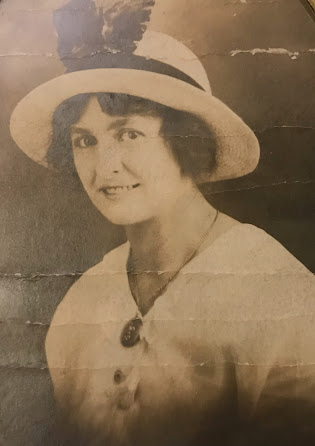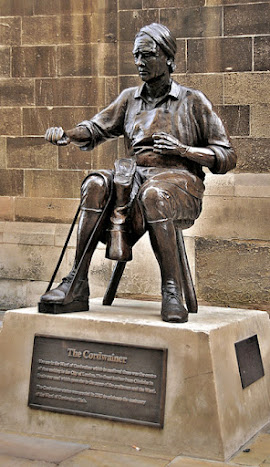Charles Vokoun - The Forester
Fraternity is the fuel that allows common people to produce uncommon results. - unknown
The 1980's being my formative years, it is incredibly difficult write about fraternity without Animal House references but for you, my gentle readers, I am determined to try. That said, reading about the times it becomes clear that fraternal or benevolent orders in Bohemian life in Chicago (and immigrant life more generally) at the turn of the 20th century were very significant community "glues" within the ethnic enclaves of the new American urban life. Understanding the immigrant experience requires, I think, an appreciation for these societies. More about this later after an introduction to Charles and his family.
Anna Bechyně Vokoun had died in September 1862 of typhoid fever. She was 25 years old and left Jan with a young family. Frank was 4, Rudolph was 2, and Louis was 9 months. Jan quickly found another spouse. He and Josephine Sazima were married in February 1863. Karel "Charles" Vokoun was their first child together. He was born February 16, 1864. He may also have been known by Carl.
Charles married Mary Podlesak in 1886. Their wedding announcement from the Denni Hlasatel:
There is not much in the record about Mary other than that she was born in Bohemia about 1864. This follows the pattern that I have observed with the other brothers who married Czech spouses. Neither Frank's wife Josepha Chlup, Rudolph's wife Lydia Otradovec, nor Mary Podlesak have records that indicate where in Bohemia they were born. The brothers all seem to have met their future wives in Chicago after their arrival. There is an immigration record that could be Mary's showing a New York arrival from Bremen in 1883. This Mary was 19 and an unaccompanied saloon worker. The record is smudged and hard to read but lacking any other leads, I have assumed it is her.
Charles needed to work to support his five children. Anna who would marry Jindrich/Henry Kopriva was born in 1888. Edward was born in 1889 and never married. Ella Mary who would marry Vaclav/James Jandak was born in 1892. Otto who married Rose Krause was born in 1894. The youngest, Mary, was born in 1897 and also never married. The family lived at 640 West 18th Street in the heart of the Pilsen neighborhood of Chicago for about 30 years. (Note: street numbers changed in 1910 when 640 was renumbered to 1524). Their home was about one block west of 18th Street and Blue Island Avenue.
 |
| 1912 photo of 18th Street and Blue Island Ave. |
After Charles died, life was probably not easy. The children became the financial supporters of the household. The 1910 census lists Mary as not employed. Anna was a seamstress, Edward worked as a glazier (glass cutter), Ella as a tailor, and Otto, age 15, was a errand boy for a printing shop. Mary seemed to stay close to the Vokoun family. She is mentioned in both Jan and Rudolph's obituary. John William Vokoun would bequeath her $1000 in his will after his death in 1914. Interestingly, he did not leave anything to Lydia Vokoun, Rudolph's widow, who had younger children than Mary. The family seemed to live productively for several years but tragedy would hit this family hard.
Anna Vokoun married Henry (Jindrich) Kropiva who immigrated in 1905 from the small village of Zelená Ves, Bohemia about forty miles south of Prague. They had three children, Harriet, Henry 'Hank', and Joe.
 |
| 1920 Census |
Ella Vokoun married James (Vaclav) Jandak in 1915. They met while Ella was nursing James' dying first wife. They had five children: James Jr., twins Ella and Rose, Joseph, and Blanche. James worked as a machinist at the Mills Novelty Company which remains today as a manufacturer and distributor of nickelodeans and music boxes. The family remembers playing with the slot machines that James' brought home from work. (I don't know if insider knowledge ever paid off in Vegas but I kind of hope so!) Ella is remembered for her feisty, no-nonsense demeanor. She was an extremely talented seamstress and baked a fantastic Czech houska (sweet bread). Ella was also an active member of a Sokol, the Czech gymnastic and social society.
 |
| James (Vaclav) and Ella Mary Vokoun Jandak |
 |
| Jandaks in 1924 (from left): Ella, Rose, James Sr., Ella, Joseph, James Jr. (Blanche was born in 1925). |
Probably the most important fact about James and Ella, though, was their devotion to their family and that includes their nephews, Hank and Joe Kopriva. The Jandaks could not take in their nephews after Anna and Mary died but the boys spent their weekends with the Jandaks and maintained a close relationship with them throughout their lives. Joe Kopriva eventually married a non-Czech, Junemarie Deffenbaugh. That he didn't marry another Czech was said to disappoint his family. As his parents and grandparents were long dead, that can only mean his aunt and uncle!
 |
| 1940 census. Harriet and Hank Kopriva living next to the Jandaks. |
Otto Vokoun and Rose Krause, a native of Stachy, Bohemia, married in 1930. Otto worked his entire life in printing and died in 1969. Rose lived until 1991. Their two sons were Richard "Dick" and Howard. I do not yet have much information on the family as I continue to try to contact their descendants but I do Rose's naturalization record from 1936 which is a fantastic source of information on her background.
Two of Charles and Mary's children never married and had no family. Edward was not well-to-do but is remembered by his family as visiting Ella periodically. He died in 1960. Mary Vokoun's story is unclear. There is another story of a drowning death in the family. As best I can gather, this was most likely the youngest daughter, Mary Vokoun, but I have yet to find records to confirm this. I can say that there are no obvious marriage or death records that belong to her but there is this photo that was preserved and we believe to be her.
 |
| Believed to be Mary Vokoun |
Charles and Mary's family tree
How to define a family? Certainly Charles and Mary's family had its share of tragedy and hardship. As in most families, the brothers had varying degrees of success, opportunity, and tragedy. Certainly, the family stories suggest some level of struggle. Fortunately, the story ended better.
















Comments
Post a Comment